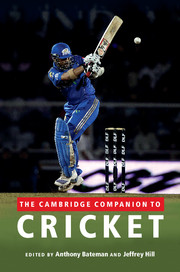Book contents
- Frontmatter
- Introduction
- 1 Cricket pastoral and Englishness
- 2 Cricket in the eighteenth century
- 3 Corruption in cricket
- 4 Broadcasting and cricket in England
- 5 Bodyline, Jardine and masculinity
- 6 Don Bradman: just a boy from Bowral
- 7 The Packer cricket war
- 8 New Zealand cricket and the colonial relationship
- 9 C. L. R. James and cricket
- 10 Reading Brian Lara and the traditions of Caribbean cricket poetry
- 11 The detachment of West Indies cricket from the nationalist scaffold
- 12 The Indian Premier League and world cricket
- 13 Hero, celebrity and icon: Sachin Tendulkar and Indian public culture
- 14 Conflicting loyalties: nationalism and religion in India–Pakistan cricket relations
- 15 Cricket and representations of beauty: Newlands Cricket Ground and the roots of apartheid in South African cricket
- 16 Writing the modern game
- 17 Cricket and international politics
- Further reading
- Index
7 - The Packer cricket war
Published online by Cambridge University Press: 28 September 2012
- Frontmatter
- Introduction
- 1 Cricket pastoral and Englishness
- 2 Cricket in the eighteenth century
- 3 Corruption in cricket
- 4 Broadcasting and cricket in England
- 5 Bodyline, Jardine and masculinity
- 6 Don Bradman: just a boy from Bowral
- 7 The Packer cricket war
- 8 New Zealand cricket and the colonial relationship
- 9 C. L. R. James and cricket
- 10 Reading Brian Lara and the traditions of Caribbean cricket poetry
- 11 The detachment of West Indies cricket from the nationalist scaffold
- 12 The Indian Premier League and world cricket
- 13 Hero, celebrity and icon: Sachin Tendulkar and Indian public culture
- 14 Conflicting loyalties: nationalism and religion in India–Pakistan cricket relations
- 15 Cricket and representations of beauty: Newlands Cricket Ground and the roots of apartheid in South African cricket
- 16 Writing the modern game
- 17 Cricket and international politics
- Further reading
- Index
Summary
There is no doubt that the dramatic intervention of Australian media magnate Kerry Packer in Australian and world cricket in 1977 represented a great upheaval that appeared cataclysmic and confusing at the time. Supporters of WSC variously labelled it as a ‘great cricket hijack’ (Christopher Forsyth), a ‘staggering coup’ (Trevor Kennedy) and even a ‘democratic revolution’ (Andrew Caro). Others contended that WSC contributed to the ‘Americanisation of cricket’ (Chris Harte), the ‘proletarianisation of cricket’ (Adrian McGregor) and the promotion of hyper-masculine values (Bill Bonney).
Because World Series Cricket had been such a well-kept secret for more than six months, the cricket world was stunned after Australian journalists Peter McFarline and Alan Shiell reported the news on 9 May 1977. The cricket establishment reacted with a great sense of outrage and betrayal at what it regarded as an underhand attack on world cricket traditions and authority.
The world cricket media, with relatively few exceptions, condemned and denigrated WSC. The upheaval in world cricket was described variously as a ‘circus’, ‘Packerball’ and ‘Packer cricket’ rather than by its name, World Series Cricket, which had been registered on 16 August 1976. After night cricket and coloured clothing were introduced another pejorative term, pyjama cricket, was added to the list. Players who signed up with Packer were described as ‘a bunch of money-hungry mercenaries’ (Eric Beecher). Such descriptions questioned the legitimacy of WSC and Kerry Packer was demonised in the press as an ogre with a ‘meat-mangler smile’.
- Type
- Chapter
- Information
- The Cambridge Companion to Cricket , pp. 100 - 115Publisher: Cambridge University PressPrint publication year: 2011
- 4
- Cited by



